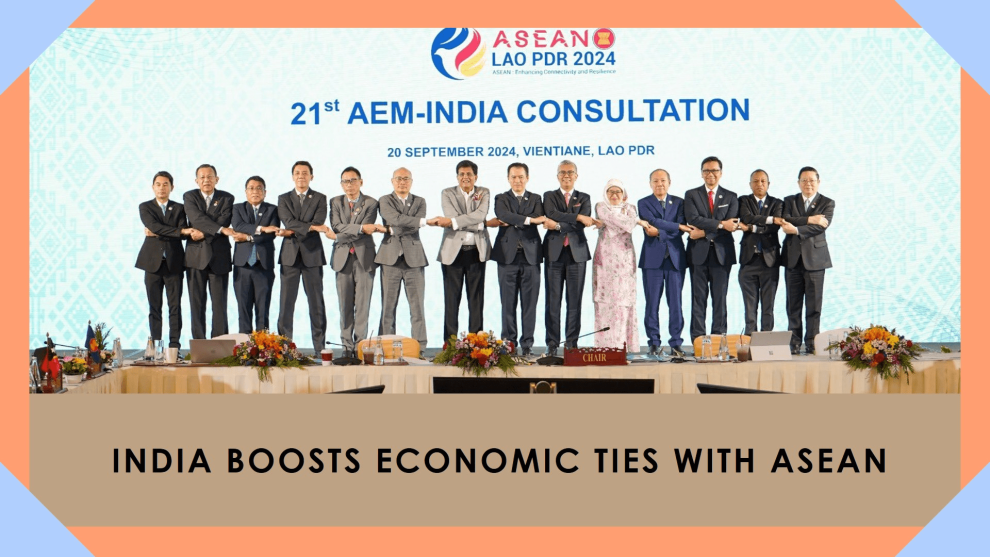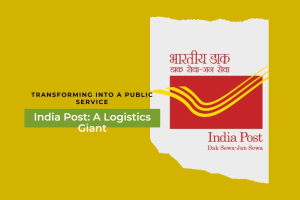The 21st ASEAN-India Economic Ministers (AEM-India) meeting, co-chaired by India’s Commerce and Industry Minister Shri Piyush Goyal and Lao PDR’s Minister of Industry and Commerce H.E. Malaithong Kommasith, marked a significant moment in India’s evolving trade and investment relationship with ASEAN. The event, held in Vientiane, Lao PDR, saw participation from all 10 ASEAN member countries — Brunei, Cambodia, Indonesia, Laos, Malaysia, Myanmar, Philippines, Singapore, Thailand, and Vietnam — along with Timor-Leste, which joined as an observer.
India and ASEAN have long enjoyed strong economic ties, and this year’s bilateral trade figures underline the robustness of this partnership. With trade touching USD 120.9 billion in 2023-24, ASEAN continues to play a crucial role in India’s global trade landscape, accounting for 10.9% of the nation’s overall trade volume.
The 21st AEM-India meeting emphasized this deepening partnership, while also addressing challenges, reviewing key agreements, and identifying paths for future growth in trade and investment.
Key Highlights of the 21st AEM-India Meeting
- Reviewing the ASEAN-India Trade in Goods Agreement (AITIGA)
One of the core agendas of the meeting was to assess the progress in the review of the ASEAN-India Trade in Goods Agreement (AITIGA), which has been a longstanding demand of Indian industries. Since its implementation, AITIGA has facilitated the expansion of trade, but it has also raised concerns among Indian industries about tariff liberalization and trade imbalances.
Minister Goyal underscored the importance of addressing injuries to domestic industries resulting from existing FTA provisions and inequitable tariff structures. He called for more balanced trade relations to avoid any further diversion of trade to other regions, urging the ASEAN-India Joint Committee to expedite the negotiations and ensure that a mutually beneficial agreement can be finalized by 2025.
- Strengthening Services and Investment Agreements
Beyond the Trade in Goods Agreement, Minister Goyal reiterated India’s request to establish Joint Committees for reviewing the implementation of the Services and Investment Agreements, which were signed back in 2014. These agreements aim to deepen cooperation in the service and investment sectors, but a comprehensive review is needed to assess their impact and explore opportunities for growth. - ASEAN-India Business Council (AIBC) Contributions
The ASEAN-India Business Council (AIBC), represented by industry leaders and hosted by the Federation of Indian Chambers of Commerce and Industry (FICCI), continues to play a pivotal role in fostering dialogue between Indian and ASEAN industries. Minister Goyal held productive discussions with the FICCI-led industry delegation and ASEAN representatives, further aligning their expectations for the review of AITIGA.
The council presented its recommendations on how to enhance trade facilitation, simplify regulations, and create an enabling environment for businesses to thrive under the AITIGA framework.
India’s Growing Economic Footprint in ASEAN
India’s trade with ASEAN has seen remarkable growth over the years, evolving from a modest volume in the early 2000s to the substantial figures reported today. This surge in trade reflects India’s commitment to fostering stronger economic partnerships in Southeast Asia, a region increasingly central to global trade flows.
Key Sectors Driving ASEAN-India Trade
Several sectors have been instrumental in shaping the India-ASEAN trade landscape. The following industries have emerged as key contributors:
- Agriculture and Food Processing: India and ASEAN countries have significant agricultural trade. India is a major exporter of rice, spices, and processed food products to the region, while ASEAN exports a variety of tropical fruits, coffee, and seafood to India.
- Textiles and Apparel: Both India and ASEAN nations have a long tradition in textile manufacturing. India’s textile exports to ASEAN are well-received, particularly in markets like Vietnam and Indonesia.
- Automobile and Machinery: The demand for Indian-made automobiles and machinery has risen significantly in ASEAN markets. Similarly, India imports a variety of industrial machinery from ASEAN countries to support its growing manufacturing sector.
Investments Flowing Between India and ASEAN
Trade is not the only area of growth between India and ASEAN; investments between the two regions have also seen a steady rise. Major Indian companies have expanded their presence across Southeast Asia, investing in manufacturing plants, IT services, and energy projects. In return, ASEAN companies have tapped into India’s growing consumer market, particularly in sectors such as retail, telecommunications, and infrastructure.
ASEAN-India investment ties have deepened in the past decade, bolstered by the ease of doing business in both regions and a shared interest in creating sustainable and inclusive economic growth.
Review of ASEAN-India Trade in Goods Agreement (AITIGA) – A Vital Step Forward
The review of AITIGA is essential to ensure that the trade pact remains effective and fair for both sides. Since its signing in 2009, the agreement has spurred a notable rise in trade between India and ASEAN, but Indian industries have expressed concerns about the unequal tariff liberalization in certain sectors. This has led to calls for a comprehensive review that addresses these imbalances and makes the agreement more business-friendly and sustainable.
Minister Goyal stressed that any review must prioritize equitable trade policies that benefit all parties involved. By revising the AITIGA framework, both India and ASEAN hope to create a more balanced and commercially meaningful agreement that encourages further economic collaboration.
Building Towards a Stronger ASEAN-India Economic Partnership
At the 21st AEM-India meeting, the Ministers reaffirmed their shared commitment to advancing economic ties. They agreed on several key initiatives to enhance cooperation in trade, investment, and other areas of mutual interest. Notably, they underscored the importance of:
- Trade Facilitation: Simplifying customs procedures and reducing trade barriers to make cross-border trade more efficient and cost-effective.
- Digital Economy: Enhancing cooperation in digital trade and e-commerce to capitalize on the rapid growth of online marketplaces in both India and ASEAN.
- Sustainable Development: Promoting green energy solutions, responsible investment, and sustainable business practices to foster long-term economic growth.
Expanding Cooperation Beyond Trade
In addition to trade and investment, India and ASEAN are expanding their cooperation into new areas, such as innovation, technology transfer, and human resource development. Initiatives to support startups, promote research and development (R&D) collaboration, and facilitate skills training are gaining traction across the region. Both sides recognize that leveraging the potential of these emerging sectors will be key to unlocking new opportunities in the global economy.
India’s Bilateral Engagements at the AEM-India Meeting
On the sidelines of the 21st AEM-India meeting, Minister Goyal held bilateral talks with several counterparts, furthering India’s economic agenda. Among the key highlights:
- Switzerland-India Bilateral Meeting: Minister Goyal met with Mrs. Helene Budliger Artieda, Switzerland’s Secretary for Economic Affairs, to discuss the India-EFTA Trade and Economic Partnership Agreement. The two sides explored the next steps in ratifying the agreement and facilitating a USD 100 billion foreign direct investment (FDI) commitment by EFTA states.
- Engagement with Indian and ASEAN Industry Leaders: Minister Goyal’s interactions with FICCI-led industry delegations underscored the importance of private-sector participation in shaping ASEAN-India economic relations. Both Indian and ASEAN industries shared their insights on trade issues and the anticipated AITIGA review.
Conclusion: Moving Towards a Prosperous Future
The 21st ASEAN-India Economic Ministers meeting in Lao PDR marks a milestone in the evolving relationship between India and ASEAN. With trade and investment ties at the forefront, both regions are committed to fostering closer cooperation, addressing trade imbalances, and unlocking new opportunities for businesses on both sides.
As India continues to integrate with global economies through its various free trade agreements, ASEAN remains a pivotal partner. The review of AITIGA, alongside other initiatives discussed at the AEM-India meeting, will lay the foundation for more equitable, sustainable, and commercially meaningful economic relations between the two regions.
India’s growing influence in ASEAN, coupled with its strategic initiatives, positions it as a key player in the region’s future economic growth. With the commitment shown by the Ministers and industry leaders at this meeting, the ASEAN-India partnership is poised for continued success in the years to come.
For more insights on SME, Startup and Businesses, visit BharatiyaMedia.com. For editorial inquiries, email sharma.maayank@yahoo.com, and for advertisements and other enquiries, contact us at contact@entrepreneur.org.in.
Read these article also:
Exploring Chhattisgarh: The Heart of Central India
The Surge of SME and Startup IPOs on BSE and NSE: Trends, Benefits, and Challenges
How to Start an E-commerce Business: A Comprehensive Guide for Beginners
Boosting Innovation: Research & Development in Processed Food
How Government Schemes are Helping SMEs
Join BharatiyaMedia WhatsApp Channel for regular updates on SMEs, Startups and Businesses












Add Comment